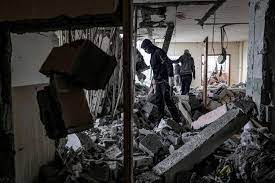In recent weeks, the ongoing conflict between Israel and Hamas has once again brought the Gaza Strip into the global spotlight. Amidst the airstrikes, rocket attacks, and escalating tensions, the plight of civilians in Gaza has become a pressing concern, particularly with reports indicating an imminent famine. Against this backdrop, the announcement of a U.S.-Israel meeting on Rafah, scheduled to take place early next week, underscores the urgent need for diplomatic efforts to address both the immediate humanitarian crisis and the broader challenges facing the region.
The decision to convene high-level discussions between U.S. and Israeli officials reflects a recognition of the severity of the situation in Gaza. White House spokesperson Karine Jean-Pierre’s statement, citing deep concerns about reports of famine in Gaza, highlights the gravity of the humanitarian crisis unfolding in the region. With President Joe Biden personally engaging with Israeli Prime Minister Benjamin Netanyahu and calling for comprehensive discussions involving military, intelligence, and humanitarian officials, there is a clear acknowledgment of the multifaceted nature of the challenges at hand.
At the heart of the discussions will be the situation in Rafah, a city in the southern Gaza Strip that has been heavily impacted by the recent escalation of violence. Reports of Israeli military operations in the area have raised alarm bells, particularly in light of the dire humanitarian conditions facing civilians. The need for urgent action to prevent further suffering and loss of life in Rafah cannot be overstated, and it is imperative that both the United States and Israel prioritize humanitarian considerations in their deliberations.
Central to the discussions will be the issue of facilitating the flow of humanitarian aid into Gaza. The United Nations’ warning of a likely famine in Gaza by May underscores the urgency of addressing the humanitarian crisis. Any meaningful progress towards alleviating the suffering of civilians in Gaza will require concerted efforts to ensure the unimpeded delivery of humanitarian assistance, including food, medical supplies, and essential services. The White House’s call for Israel to do more in this regard reflects a recognition of the critical role that access to humanitarian aid plays in mitigating the impact of conflict on civilian populations.
However, addressing the immediate humanitarian crisis is only one aspect of the broader challenges facing the region. The underlying causes of the conflict between Israel and Hamas, including issues related to security, governance, and the welfare of Palestinians, must also be addressed in order to achieve lasting peace and stability. Any sustainable solution to the conflict will require a comprehensive approach that addresses the root causes of the violence and seeks to address the legitimate grievances of all parties involved.
In this context, the upcoming U.S.-Israel meeting on Rafah presents an opportunity to not only address the immediate humanitarian crisis but also to lay the groundwork for a more sustainable peace in the region. By engaging in frank and constructive dialogue, both parties can work towards identifying practical steps to de-escalate tensions, promote confidence-building measures, and advance the prospects for a negotiated settlement to the conflict.
Moreover, the involvement of the United States underscores the importance of international engagement in resolving the conflict and promoting peace and security in the region. As a longstanding ally of Israel and a key player in the Middle East peace process, the United States has a unique role to play in facilitating dialogue, promoting reconciliation, and supporting efforts to address the underlying causes of the conflict.
The U.S.-Israel meeting on Rafah represents a critical opportunity to address the humanitarian crisis unfolding in Gaza and to advance the prospects for a peaceful resolution to the conflict between Israel and Hamas. By prioritizing humanitarian considerations, engaging in constructive dialogue, and working towards a comprehensive approach to addressing the root causes of the violence, both parties can take meaningful steps towards achieving lasting peace and stability in the region.
